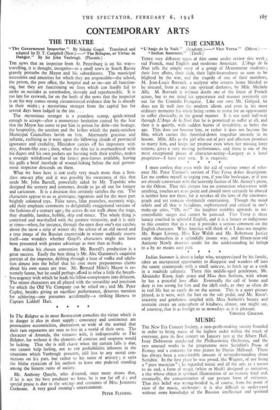CONTEMPORARY ARTS
THE THEATRE
THE news that an inspector from St. Petersburg is on his way— travelling, it is thought, incognito—to a small town in South Russia gravely perturbs the Mayor and his subordinates. The municipal necessities and amenities for which they are responsible—the school, the prison, the post office, the hospital and so on—are all function- ing, but they are functioning on lines which can hardly fail to strike an outsider as unorthodox, slovenly and reprehensible. It is too late for eyewash, for on the heels of the news that the inspector is on his way comes strong circumstantial evidence that he is already in their midst ; a mysterious stranger from the capital has for several days been lodged in the inn . . .
The mysterious stranger is a penniless scamp, quick-witted enough to accept—after a momentary hesitation caused by the fear that the Mayor has come to put him in prison for debt—the homage, the hospitality, the unction and the bribes which the panic-stricken Municipal Councillors lavish on him. Alternately gracious and sultanic, reclining as it were upon the billowing clouds of provincial ignorance and credulity, Hlestakov carries off his imposture with airy, dream-like ease ; then, when the thin ice is overburdened with his dupes and his own pockets are bursting with their roubles, makes a strategic withdrawal on the fastest post-horses available, leaving his gulls a brief interlude of wound-licking before the real govern- ment inspector descends on them.
What we have here is nor really very much more than a first- class one-act play and it was possibly his awareness of this that made Mr. John Burrell, powerfully aided by Mr. Topolski who designed the scenery and costumes, decide to go all out for fantasy and caricature. It is a decision that certainly satisfies the eye. The characters appear to us as grotesque, ingenious and for the most part brightly coloured toys. False noses, false paunches, eccentric wigs, add their emphatic comments to delightfully exaggerated versions of the fashions of a century ago ; the actors do not walk about the stage, they shamble, lumber, hobble, skip and mince. The whole thing is contrived and marshalled with the greatest virtuosity, and it is only at times—when, for instance, through the open door one's eye catches above the snow a strip of winter sky the colour of an old sword and a true image of the Russian countryside in winter suddenly asserts itself—one wonders whether Gogol's characters might not have been presented with greater advantage as men than as freaks.
But within his chosen convention Mr. Burrell's production is a great success. Easily the best thing is Mr. Alec Guinness's exquisite portrait of the impostor, drifting through a haze of vodka and adula- tion almost into the belief that his ever more preposterous claims about his own status are true. Mr. Bernard Miles's Mayor is ex- tremely funny, but he could perhaps afford to relax a little the breath- less urgency with which he leads his fellow-conspirators into delusion. The minor characters are all played with the versatility and precision for which the Old Vic Company can be relied on • and Mr. Peter Copley, besides giving an excellent performance, deserves mention for achieving—one presumes accidentally—a striking likeness to Captain Liddell Hart.
* *
IN The Relapse as in most Restoration comedies the virtue which is in danger is also in short supply ; constancy and continence are provocative eccentricities, aberrations so wide of the normal that their rare exponents are seen to live in a world of their own. The character of Amanda, the virtuous wife, is indispensable to The Relapse, for without it the elements of contrast and suspense would be lacking. That she is still chaste when the curtain falls is due, one cannot help feeling, not to any probabilities inherent in the situations which Vanbrugh presents, still less to any moral con- victions on his part, but rather to his sense of artistry ; it suits the blithe cynicism of his outlook to leave one pedestal standing among the bizarre ruins of society.
Mr. Anthony Quayle, who directed, once more shows that, if he is not the best producer we have, he is not far off it ; and special praise is due to the settings and costumes of Miss Jeannetta Cochrane. A very good evening's entertainment.
PETER FLEMING.






























 Previous page
Previous page